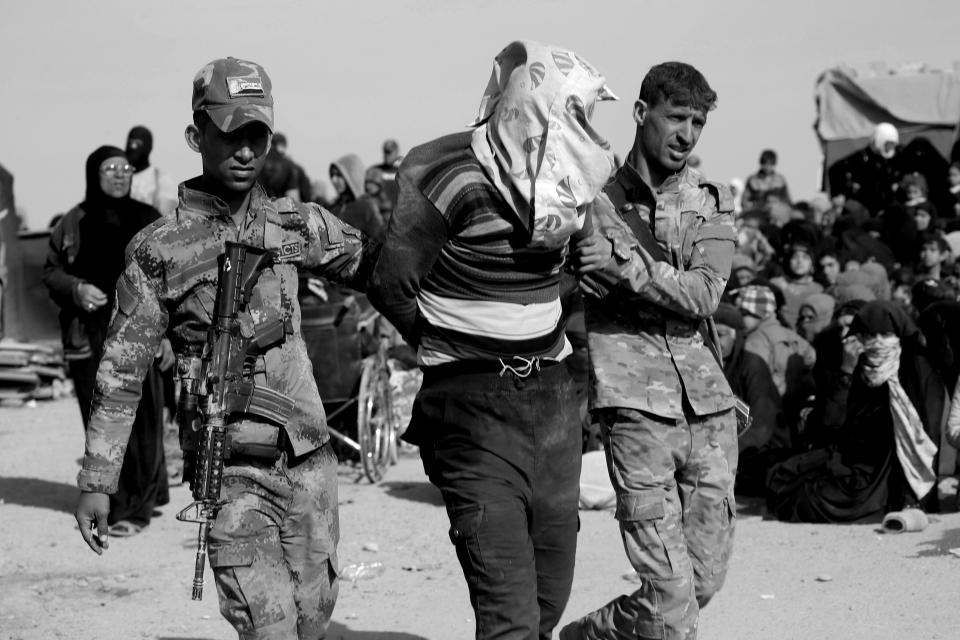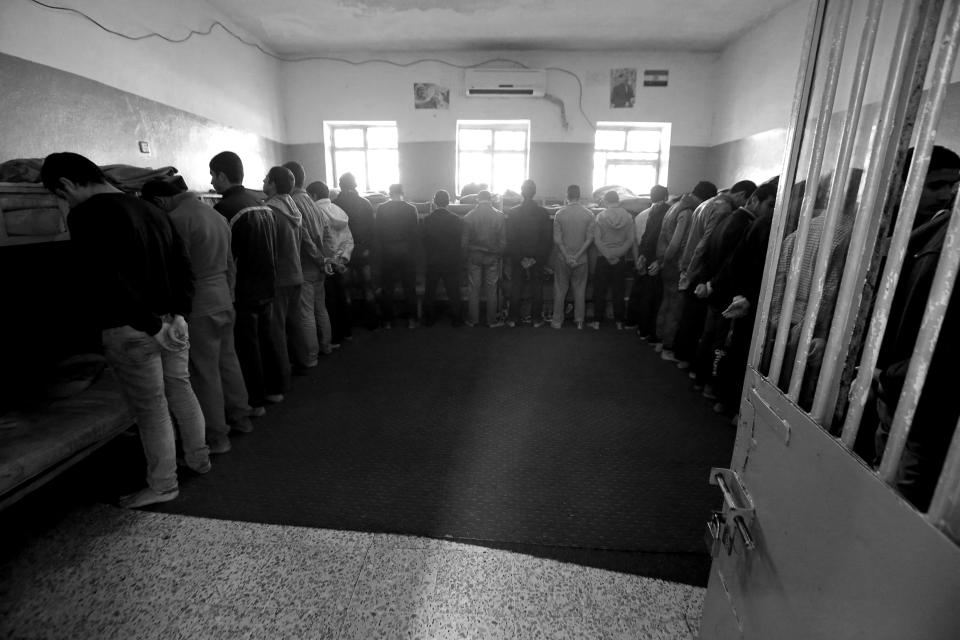For captured ISIS fighters in Iraq, justice is swift and conviction certain

MOSUL, IRAQ — “Haya-al-Adel,” 20-year-old Hamza Ali Salim declared, an Arabic phrase for “Long live justice,” after he was handed a sentence of only 15 years in prison.
Salim was accused of illegally training with the Islamic State, preaching falsely at a mosque and persuading people to fight against the Iraqi army.
Now that the Iraqi government has declared the end of ISIS in Iraq following the recapture of western Anbar province, along the Syrian border, trials for ISIS militants and suspected members have begun.
Iraqi authorities have arrested hundreds of suspected ISIS fighters, including foreigners from Turkey, Russia, the United States, Germany and France. They have been transferred to Baghdad for security reasons. But many of the Iraqi suspects are being tried just outside Mosul.

Yahoo News was granted rare media access to some of the trials at the Mosul courthouse.
The courtroom was a small room with a high bench where three judges sat between two Iraqi flags. In the middle was the head of the court, Judge Jamal. Adjacent to the bench was a female prosecuting attorney, and below was a desk where secretaries recorded the trials.
Salim was the first suspect brought into the room. He was covered in dust, his athletic pants torn and tattered. He stood facing the judges while a public defender sat behind him and took notes.
Judge Jamal asked him, “What is your relationship to ISIS?”
Salim responded, “Nothing. I was just going to the mosque to study. The Quran is not forbidden.”

The judge reminded him that he admitted to serving on ISIS military bases in his confession. Salim denied the accusation and said he was tortured into his admission.
Reading from notes, the public defender argued that Salim was pressured to cooperate with ISIS while the militants occupied Mosul. In U.S. jurisprudence, that’s called “ arguing in the alternative ” — presenting two or more defenses that may be mutually contradictory, in the hope the court will accept at least one of them — but that concept doesn’t exist in the Iraqi court. Because Salim’s testimony in court contradicted his confession, the public defender said the judges should not separate Salim’s two accounts; they had to either accept or reject the confession as a whole.
When Yahoo News spoke to the chief justice of Mosul, Salem Mohammed, he said that when a suspect is arrested “and there is enough evidence, then he goes to court.” Evidence can include a confession or testimony from witnesses or “if, when [Iraqi forces] arrest him, he has a gun.”
He said that when a suspect is brought to court, he is often presumed guilty. The trials witnessed by Yahoo News lasted around 20 minutes each on average.

Human Rights Watch representative Belkis Wille told Yahoo News during an interview in Erbil that less than 5 percent of the cases are dismissed, “and they claim it’s because the information they have is so good, but I don’t think that’s all that’s going on.”
She explained, “Unfortunately this justice system revolves around confessions. In Iraq, generally, when there is a crime, they hold the guy and beat him until he says he did it and that is the evidence.”
Wille added the Iraqi justice system is “perpetrator-centric rather than victim-centric,” and victims are not given the chance to participate in the process or given the opportunity to attend hearings.
“I don’t necessarily think they care that much if they get it right or not,” Wille added. “A lot of this is a symbolic statement for the government to show [it’s] tough on ISIS.”
Mohammed said that isn’t true, and that during the initial investigation process, witnesses are brought to the court. They have to swear on a Quran or a Bible, depending on their religion, to tell the truth.
Back at the courthouse, however, there were no civilians sitting in on the trials.

The second suspect, 29-year-old Mohanad Moshin, was brought into the courtroom. He was short in stature, and had on a dusty athletic jacket and wore sandals to cover his feet. His beard was unkempt and he shuffled nervously.
Judge Jamal asked Moshin his nickname, possibly as a trick question: ISIS was known to give its fighters new identities. But Moshin gave his family name instead. He was then escorted out of the room while a public defender was sought.
Defense attorneys and public defenders have been scarce during the trials because no one wants to be accused of siding with ISIS. Last August, Iraqi authorities swept through Mosul arresting several defense lawyers claiming they were members of ISIS. Defending the group could result in a lawyer’s death or threats to his family. But according to Iraqi law, there still needs to be someone present for trials to proceed — seemingly more as a courtesy rather than an actual defense.

When Moshin’s trial began, the judges questioned him about his involvement. He had turned himself in to Iraqi authorities and confessed: “I worked as a guard [for ISIS] and moved around as an associate to them. I also prepared food for the militants.”
When Judge Jamal read out Moshin’s full charges and accusations, he asked, “Do you have anything to say?”
“Find the right judgment,” Moshin answered. He was sentenced to 15 years because he had been honest. Moshin smiled as he walked out of the courtroom. He was going to live.
Following his sentencing, Moshin helped carry in the third suspect, Ibrahim Najm, 24, to the courtroom. Najm was unable to walk and, rumor had it among the courtroom guards, he had been injured while fighting against Iraqi forces. He would later tell the court he was arrested after fleeing with his wife.
Najm’s body shook in fear while he bowed his head low. His brown T-shirt was tattered, held together by what looked like pieces of white plastic. His long eyelashes hung over his round, beady eyes. His shaven head was covered in dandruff. Unlike the two previous suspects, he had no sandals on his feet, and appeared gaunt and frail under his loose clothing.

Judge Jamal looked at him and called the prison representative into the courtroom. He berated him for Najm’s condition and told him to tell his bosses they needed to “treat the suspects better,” and that it was “very disrespectful” to bring him to court like that. He told the representative they should be “treated according to law and human rights.”
When the representative left the room, the judge reviewed Najm’s charges.
Najm was accused of fighting for ISIS and possessing a weapon. Najm denied training or fighting with them.
“Why did you support them?” the judge asked anyway.
He snuffled before responding, “My father was a militant; he told me to go with Daesh,” using the Arabic acronym for ISIS. He explained that his father and brothers were fighters and had been killed during the fight for Mosul.
The judge, “Did [ISIS] give you an AK[-47] or a pistol?”
Najm responded, “An AK-47 and three magazines.” He added he needed a salary to survive, and ISIS offered him about $150 a month .

Despite the harsh accusations made against Najm, Judge Jamal took pity on him and gave him only 15 years as well, saying, “We don’t count your father and brothers’ crimes against you,” but he also warned that Baghdad would get the final say in his sentencing.
No one was sentenced to execution during this round, but the judge reminded suspects of the severity of their crimes and that according to Iraqi law, they deserved to die. He was, under the circumstances, being lenient, even compassionate.
*****
But the fate of foreign suspects is expected to be different. Belkis Wille said the Iraqi attitude toward foreigners is they “came to do damage to [this] country, and are most deserving of the death penalty.”
Chief Justice Mohammed agreed, saying they “came to kill citizens of this country and should be judged according to the laws of this country.”
On the streets of Mosul, citizens also agreed. Yahoo News spoke to one man who owns a blanket shop. Rafed, 47, said, “They have to be executed. They destroyed [this city]. How could I not judge them like this?”
His cousin, jewelry shop owner Jadan, agreed: “Just the way [ISIS] executed people, they should also be executed.“
Rafed, however, also believes that if the Iraqi forces and the government don’t treat the citizens of Mosul fairly, the situation will happen again.

Two young men running a furniture store thought anyone associated with ISIS should be executed, along with their families. Twenty-eight-year-old Ahmed said, “If you plant poison, what do you get? Poison.” During the ISIS occupation, he said, “I stopped going to the mosque to pray because they asked me to work for them a lot. Foreign, Iraqi, wherever they’re from, they should be executed.”
Ahmed’s friend, called by the same name, drew a distinction between Iraqis recruited by ISIS and the fighters who came from abroad. “There was no forgiveness with the foreigners. Sometimes the Iraqis would let you go, but the foreigners did whatever they wanted.”
*****
Despite European Union countries’ objection to the death penalty, French diplomats have said adult suspects should be tried in Iraq and they would make efforts only on a case-by-case basis to repatriate children. Germany has reached out to Iraq concerning a 16-year-old ISIS wife, who was found last summer and paraded by Iraqi officials as a guilty party. She is now in a juvenile facility and awaits the next step. But the U.S. has largely been silent.
According to Wille of Human Rights Watch, “The problem with the U.S. and the U.K, in particular, is because of their history in Iraq,” referring to the 2003 invasion. “They’re staying far away.”
She also noted there isn’t an appetite in the foreigners’ home countries to have “these people brought home and stand fair trials. They’re going to stay here,” she said, “[and] be convicted under counterterrorism laws and likely executed.”

It’s a convenient solution for Western countries that don’t want take on more responsibility — apart from military support. Maintaining friendly relations with Iraq is paramount in continuing their own campaigns against terrorism.
But while Iraq celebrates victory over ISIS without any program to include victims in the trial or rebuilding process, the atmosphere is ripe for resentment among citizens — and another uprising of frustrated militants could be on the horizon.
Ash Gallagher is a journalist covering the Mideast for Yahoo News.
_____
Read more from Yahoo News:


